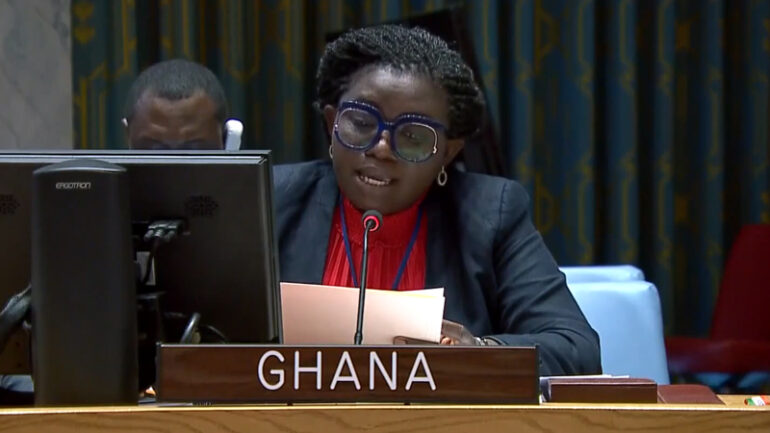UNSC: The Forced Displacement of Ukrainian Civilians and the use of Filtration Operations

Mr. President,
At the outset, I would like to thank Madame Rosemary Dicarlo, Under-Secretary-General for the Department of Political and Peacebuilding Affairs and Madam Iize Brands Kehris, Assistant Secretary-General for Human Rights and Head of the Office of the United Nations High Commissioner for Human Rights, for their briefings. I also thank the civil society representative, Ms. Olexandra Drik for her contributions to the Council’s discussions. Since the beginning of the war in February this year and in only a period of six months, at least 14 million people are estimated to have been forcibly displaced from their normal places of abode. Close to 6.9 million people have sought refuge in neighbouring countries while some 7 million more have been internally displaced. Although, some Ukrainian nationals have crossed back into Ukrainian territory, the numbers pale in comparison to those who are compelled to leave their homes on a daily basis.
The situation which has been infamously described as the “world’s largest and fastest evolving displacement crisis since the second world war” is alarming and calls for urgent and concerted international action to help end the war that has become the driving force behind the mass displacements of persons. Ghana is concerned that women and children are the most affected by the war and account for the greatest portion of displaced persons. Naturally, many of these women are pregnant, have children or suffer some form of disability or vulnerability. This Council has also in previous briefings received information about human rights abuses, including conflict related sexual violence suffered by the displaced women and children of Ukraine.
We are disheartened by the realization that many of those who have been displaced will not be able to return to their homes and the lives they once lived as a result of the extensive damage and destruction caused to several cities and residential facilities across Ukraine. Despite the grim outlook, we note with appreciation the essential support mechanisms and humanitarian assistance being offered by the United Nations and its affiliate humanitarian agencies as well as and non-governmental organizations.
We also commend those neighbouring countries that continue to receive millions of people into their territory and provide them with the needed assistance notwithstanding their own internal circumstances and challenges. These countries must be granted additional support, where possible, to enhance their response capacity and ensure that adequate protection and assistance are extended to those who now find themselves as refugees.
We recommend that humanitarian assistance extended to the displaced persons should include counselling and psycho-social services to help those who have been traumatized by the experience of the war. Children must also be protected, and their best interest prioritized at all times.
Mr. President,
Ghana condemns all acts of human rights abuses against civilians, including the reported cases of filtration processes and other acts which could possibly amount to war crimes. Filtration operations can be inhumane and constitute violations of international humanitarian law and human rights laws. In this vein, we call for thorough, impartial and independent investigations of such reports and allegations of abuses to establish the facts and ensure accountability on the part of the perpetrators and justice for the victims.The attacks on civilian populated areas and the destruction of civilian infrastructure are not only unjust, they, are also unacceptable and must cease from continuing. We call upon the warring sides to comply with their obligations under international law, international humanitarian law and human rights law. Let me emphasize that the cessation of hostilities is crucial to stem the displacement and other humanitarian crises in Ukraine. The war must end now.
We reiterate our call to the Russian Federation to immediately and unconditionally withdraw its forces from the internationally recognized borders of Ukraine. Ghana maintains the view that there can be no military solution to the war, unless the warring sides refocus their attention and resources from the battlefield to the table of negotiations and diplomatic approaches,
the several crises brought about by the war will continue to evolve and further threaten global peace and security. In re-affirming Ghana’s unwavering support for the sovereignty,
political independence and territorial integrity of Ukraine and its people, I wish to reiterate our principled position not to recognize any unilateral annexation of territory through the threat or use of force by any one state against the other.
Finally, we urge the members of this Council to prioritize the interests of the ordinary people of Ukraine as we work towards an early and comprehensive solution that would secure peace and stability in Ukraine.
I thank you.
